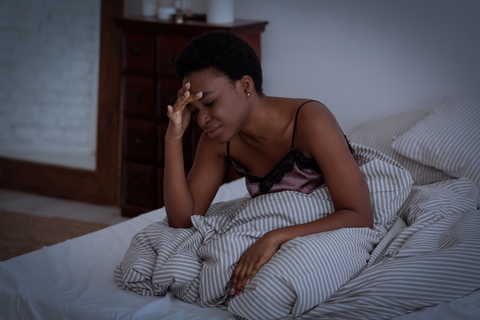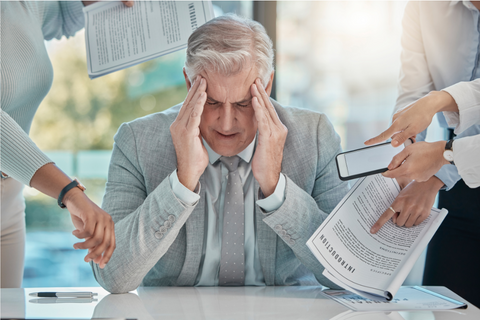What is the Difference Between Stress and Anxiety?
Stress and anxiety are two very common emotional responses that impact everyone to some degree. While they may feel similar at times, it's helpful to understand the differences so you are able to manage them both effectively.
What is Stress?
According to the World Health Organization, Stress is defined as “a state of worry or mental tension caused by a difficult situation”. Stress is a totally natural human response that encourages us to address challenging times in our lives.
It can be a reaction to a variety of current situations, such as work deadlines, financial pressures, health concerns or relationship issues, and everyone responds to stress differently.
Stress usually reduces once the specific challenge has passed.
A little bit of stress can help keep us focused on finding a solution to our challenges, however if we have too much stress in our lives, it may be hard to relax or concentrate, and could lead to anxiety or burnout.

Click the button to speak to an Anxiety Specialist
What is Anxiety?
Anxiety, on the other hand, is a state of worry and fear that is often disproportionate to the actual situation. Anxiety can persist even when there's no immediate threat or danger, however we believe a situation is dangerous even when we have no evidence to support this thought.
Anxiety can also have its benefits, as its sole purpose is to keep us safe, and it can help motivate us to step outside our comfort zone.
Anxiety can also occur as a direct result of feeling stressed, and we can feel stressed about feeling anxious, however they can both also manifest independently.

What Does Stress and Anxiety Feel Like?
Both stress and anxiety are common, and they also share similar symptoms including:
- Digestive issues
- Muscle tension
- Heart palpitations or increased heart rate
- Difficulty concentrating or staying focused
- Dizziness
- Muscle tension
- Irritability or anger
- Headaches
- Insomnia, restfulness or difficulty staying asleep
Anxiety has additional symptoms, such as:
- Feeling overwhelmed
- Feeling nervous
- Feeling worried
- Feeling panicked

Click the button below to book a Free Consultation call
What are the Key Differences Between Stress and Anxiety?
Duration
Both stress and occasional anxiety can be short-term and related to a specific situation or event, and both can be persistent and chronic when long lasting.
Both stress and anxiety can occur in the present moment, however anxiety frequently relates to a situation or event in the future that is yet to happen. Therefore, to some one struggling with long term anxiety, there appears to be no end date for the anxiety to subside, and the feelings are often transferred across multiple future events.
Anxiety often feels as if you are reliving the fear of the future event over and over, even though it has not yet happened.
Trigger
With stress, once the specific situation has passed, such as a job interview or test, the stress and the associated feelings subside.
On the other hand, anxiety is often a general feeling of impending doom, nervousness and overwhelm, rather than a specific situation, and therefore tends not to have a specific trigger.
Intensity
Stress is a response to an external pressure and is typically a more moderate emotional state.
Anxiety can be intense and persistent.
Understanding Anxiety Related Disorders
Everyone feels stress and anxiety sometimes, but when we feel anxious over a prolonged period of time, it is known as an anxiety disorder.
Anxiety disorders involve repeated and sometimes continuous episodes of sudden and intense feelings of fear, which restrict every day life and are difficult to control. The feelings we experience are often not in proportion to the actual situation we face, and can reoccur frequently. We often believe the worst will happen, even when we have no evidence to support this belief.
We can also have more than one anxiety disorder, and they can go hand in hand.

Different types of anxiety disorders include:
Generalised Anxiety Disorder (GAD)
GAD includes persistent and excessive anxiety and worry about a situation, perceived or real, that we “expect” will happen in the future. The expectation of the event may or may not be based on a similar situation that has occurred in our past. Or it may be an expectation that we have created in our minds that is not necessarily realistic.
The fear and worry is often out of proportion to the anticipated event or circumstances, however, it feels very real to the person struggling with GAD.
Generalised Anxiety Disorder can often occur alongside other anxiety disorders, or depression.
Social Anxiety Disorder (SAD)
When we have Social Anxiety Disorder, we often avoid situations that involve other people, especially if we don’t know them well, usually because we are afraid of embarrassing ourselves or drawing attention to ourselves.
We often feel self conscious and anxious about what others will think of us. We have a persistent fear of being watched or judged. As a result, we find it difficult to walk into a crowded place, hold a conversation or even engage in small talk, and we tend to want to avoid social situations at all costs.
Deipnophobia is a form of social anxiety. It is not so well known but it is very common in people with social anxiety. This is where we have a specific fear of eating in front of others, again because we fear we are being watched and will make a fool of ourselves.

Click the button below to book a Free Consultation call
Separation Anxiety Disorder
Separation anxiety is a form of anxiety that mostly impacts babies and young children but can also show up in teens and adults. Separation anxiety can cause clinginess, nervousness or fear when a parent or loved one leaves them, or are out of sight.
Toddlers and young children worry that they will be lost from their parent or caregiver, or that something terrible will happen to their parents if they are not together.
Nearly all children between the ages of 6 months and 3 years old have separation anxiety at some point and are clingy to some degree. But the symptoms of SAD are more severe.
Obsessive Compulsive Disorder (OCD)
Someone struggling with OCD will have excessive and recurrent anxious unwanted thoughts and will often try and relieve these obsessive thoughts by compulsively performing repeated rituals.
Someone with OCD may be able to recognise that the rituals are compulsive and not logical, but will continue to use them as a coping strategy to manage the intrusive anxious thoughts. Performing these rituals will usually only provide temporary relief, hence the perceived need for the compulsion to be repeated over and over, as they have a belief that their anxiety would escalate should they be unable to perform these rituals.
Examples may include repeatedly washing their hands if they are concerned about coming into contact with germs, or repeatedly checking their doors are locked if they are anxious about their safety.

Health Anxiety Disorder
Health Anxiety Disorder is when we have intense feelings of worry, fear and panic that are directly linked to a physical health condition, or we are excessively worried about becoming seriously ill in the future, even when we have no physical symptoms.
Some one struggling with health anxiety will frequently check their body for signs of illness, and often visit their GP regularly. Health Anxiety, or hypochondria, is related to Obsessive Compulsive Disorder.

Sleep Anxiety Disorder
Sleep anxiety is the fear or worry about going to sleep. It can happen for many different reasons and the thought of lying awake worrying at night may leave us feeling anxious about getting into bed.
Sleep anxiety can affect adults, teenagers and children.
We may be anxious about falling asleep in the first instance and/or not being able to go back to sleep should we wake up during the night. Sleep disturbances are a very common symptom of general anxiety.
Alternatively, we may be scared of having nightmares or night terrors, or we may believe something terrible will happen in the night, such as a burglary or a house fire.
Some people fear that they just won’t wake up in the morning.

Click the button below to book a Free Consultation call
Post Traumatic Stress Disorder (PTSD)
PTSD may occur after a particularly traumatic and terrifying event where some physical harm occurred, was witnessed or threatened.
PTSD was originally recognised in war veterans but it is now widely acknowledged that any event that is traumatic to the individual may trigger PTSD including violent personal assaults, natural or human-caused disasters, or accidents.
Someone with PTSD usually finds it difficult to relax, and will experience upsetting night terrors or flashbacks of the event.
Panic Disorder
Panic Disorder is when we have repeated and sudden feelings of fear or terror that intensify within seconds and reach a peak within minutes. The associated intense symptoms are an increased and rapid heartrate, alongside chest pains, and this can feel as if we are having a heart attack. We also struggle to breathe and this exasperates our anxiety and panic.
Panic attacks are extremely unpleasant and as a result, we can become fearful of having another attack, which in turn increases our anxiety. Therefore, we may choose to avoid situations where panic attacks have previously occurred.

Click the button below to book a Free Consultation call
Phobias
If you have an intense fear of a specific object, place, situation, feeling or animal, then it may be a phobia. People with phobias often have a heightened feeling of danger towards the situation or object, and this fear can even be triggered by a thought or image of the situation or object.
Someone with a phobia may recognise that their fear is excessive to the situation or object but are unable to control it. Someone with a phobia would often go to great lengths to avoid the thing that’s causing them anxiety.
Agoraphobia
This is a specific and common phobia when we fear and avoid places or situations that might cause panic or feelings of being trapped, and where we are unable to escape or get help if something were to go wrong.
This may result in someone avoiding travelling on public transport or being in a car, fear visiting supermarkets or shopping centres, or in extreme cases, avoid leaving home all together.

Selective Mutism
This anxiety disorder tends to impact children more than adults and we have seen a dramatic increase since the isolation of the pandemic.
Selective mutism is when a child chooses not to speak in a specific situation, such as school or when around authority figures, however they are able to speak in an alternative environment.
While it usually starts in childhood, if left untreated, it can continue into adulthood.
Selective Mutism should not be confused with someone choosing not to speak in certain situations. When someone is struggling with selective mutism, they are literally unable to speak and they go into a anxious “freeze” response ( part of the fight/flight/freeze response to perceived danger).

Click the button below to speak to an Anxiety Specialist
Coping Strategies
Now that we understand more about the differences and similarities between stress and anxiety, we can explore effective ways to overcome and manage them.
- Identify your triggers for stress and anxiety as this helps you to address them more effectively.
- Practice relaxation techniques such as deep breathing, meditation, mindfulness, journaling or yoga to help calm your mind and body.
- Ensure you are getting enough sleep as this is an important time for your body and mind to repair and rejuvenate. Have a consistent bed time routine and ensure your bedroom is dark, quiet and a comfortable temperature.
- Exercise regularly as this will release the feel good hormones including endorphins, which can reverse the immediate effects of stress and anxiety.
- Speak to a trusted friend or family member as connecting with others is known to boost our mood.
- Keep to a daily routine as this helps us use our time more efficiently and enables us to feel more in control of the situation that is challenging us. Organise your tasks and set small realistic goals that are achievable. Effective time management can also reduce the pressures of overwhelm and tight deadlines.

Stress and anxiety are different emotional responses, and understanding their differences is the first step towards managing them effectively.
While stress can often be managed through self-help strategies, anxiety may require professional intervention.
Remember, you are not alone in your journey to better mental health, and seeking help is a sign of strength, not weakness.
If You Need Further Support
If you need further support with your Mental Health, a trained Anxiety Specialist can prescribe a personalised plan to understand the root cause of worry and anxiety, as well as help you develop healthy coping strategies that are focused around your individual needs.
Taking care of your mental health is an essential part of your overall well-being. Left unresolved, mental ill health can spiral out of control and have a significant impact on relationships, work, school and family life.
So if you want to take the next steps to have a happier life, click the link below and book a free no obligation consultation call.

Click the button below to speak to an Anxiety Specialist
Additional Resources
Read What Causes Anxiety?
Read What Are The Different Types of Anxiety?
Watch How to Feel Less Anxious
Watch How To Reduce Anxiety Immediately
Download Circle of Control and Influence worksheet
Download Cognitive Distortions worksheet

Click the button below to speak to an Anxiety Specialist






